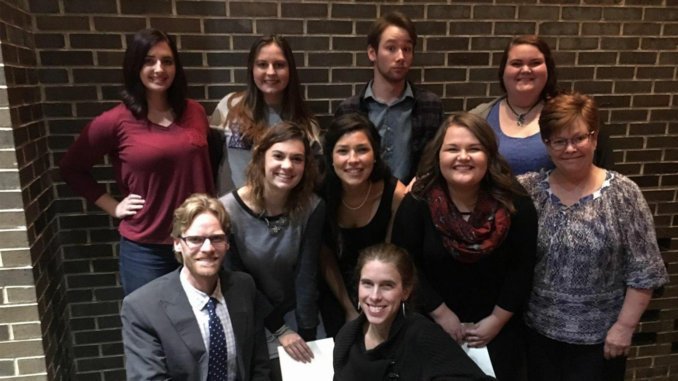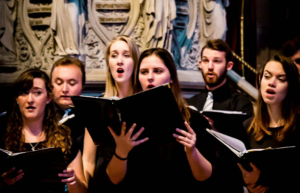
Following an amazing performance at NATS this fall, Truman’s vocalists have walked away from the competition with more than just a ranking—they’ve gained an edge on another year of training.
The National Association for Teachers of Singing hosts regional and national competitions all over the country, including its central Midwestern division comprised of students from Missouri, Iowa, and Illinois. Truman has attended this competition for three of the past four years.
Truman students have used the competition to extend their resumes, make professional connections and gain valuable criticism. Those who do not want to actively compete in their divisions can still participate in workshops and master classes to help study special topics in performance and vocal teaching.
Cady Thomas, a senior and music major at Truman, won this year’s advanced division for women. This isn’t her first win, though.Thomas won the women’s lower division in both her freshman and sophomore year.
“It’s always a good experience, and even though it is competitive, I’ve never had any kind of bad experience with people being snobby or something like that,” Thomas says.
Despite not coming to Truman as a music major, Thomas won the music department’s Gold Medal competition her freshman year. That was the last time in four years that a vocalist has won the competition.
Following an audition for choir, Thomas says a professor encouraged her to switch her major from English to music. Thomas also played a lead role as Gretel in the Spring 2017 production of Hansel and Gretel.
Thomas says she would like to be a teacher, especially of vocal pedagogy and literature, hopefully at a higher level. Even after she graduates from Truman, Thomas says she definitely intends to continue competing in NATS. Thanks to her participation in NATS, Thomas says she’s already made connections with multiple schools where she can pursue her teaching career.

Emily Heyl, a graduate student who’s currently pursuing a Master of Arts in Education, took second place in her division this year. This is also her first year attending NATS. Heyl also played a role in Hansel and Gretel.
Heyl says she began to take vocal lessons this semester, and her instructor encouraged her to use NATS as a chance to get feedback from others.
“Seeing other people perform both within your division and outside of Truman, judging just how they present themselves and the techniques they use, is a huge learning experience,” Heyl says.
Prior to the competition and the opera, Heyl says she had participated in her high school choir and always had a passion for singing as a side interest.
Rachel Buttram, a sophomore and music major at Truman, only made it to the second of four rounds in her division. Buttram too was involved in the Spring 2017 performance of Hansel and Gretel, as well this November’s performance of The Opera Bunch.
Buttram says she was pleased with the conference, and was very confident with Truman’s overall performance at NATS.
Buttram explains that for her, these competitions are about feedback as much as the experience of performing. The more she performs, she says, the more comfortable she gets with it, which allows her to find her genuine voice as opposed to her “nervous” one.
“My biggest thing that I took from it was that experience of performing allowed me to reveal a part of my voice I had never experienced,” Buttram says.
Buttram says if she had the chance, she’d be more than happy to compete again. In her division, though, Buttram was placed against a fellow Truman student—Allison Holloway, a friend of Buttram’s, and who was a runner up for this year’s finals.
The competition consists of four rounds, Buttram explains. All singers compete in the first round. Round two is narrowed down by judges based on whoever performs the best, which is the semi-finals, and from the semifinals the winners go on to the fourth and final round. The conference judges its performers based on their age and which style of music they perform. Buttram made it to round two, while Holloway made it to semifinals.
While going up against a friend might seem daunting to some, Buttram says neither of them were really there to compete but were more interested in the feedback, so they can both learn and grow as performers.
“We competed, of course, but we didn’t really see it as a competition,” Buttram says.
Buttram says she was inspired to enter the competition after her older brother competed. On top of that, she was encouraged by her vocal professor to try and get herself out in the public eye for some feedback.
“It went extremely well,” Buttram says. “I went not so much for the competition, but to get feedback. I think we all did a really good job, and I think I got a lot of feedback that’s going to help me be a better singer, and being a better singer will help me be a better teacher.”
